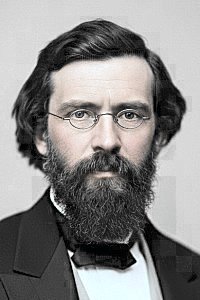Introduction

Born: February 18, 1819, Manchester, New Hampshire.
Died: January 18, 1875, Elkhorn, Wisconsin.
Buried: Hazel Ridge Cemetery, Elkhorn, Wisconsin.

Born: February 18, 1819, Manchester, New Hampshire.
Died: January 18, 1875, Elkhorn, Wisconsin.
Buried: Hazel Ridge Cemetery, Elkhorn, Wisconsin.
Webster composed and performed popular music. He studied with Lowell Mason and was active musically in New York, New Jersey and Connecticut, and directed a quartet company called the Euterpeans.
In 1851, he moved to Madison, Indiana, followed by Chicago, Illinois (1855); Racine, Wisconsin (1856); and finally Elkhorn, Wisconsin (1857).
Webster wrote over a thousand ballads and many hymns. His most famous secular song was his 1857 Lorena (words by Henry D. L. Webster). In its day, it was said to have been second in popularity only to Stephen Foster’s Suwanee River. It was sung by thousands of soldiers on both sides of the American civil war.
An instrumental version appears in the 1939 film Gone with the Wind, when Scarlett O’Hara is manning the stall at the charity dance in her mourning outfit.
The tune also made an appearance in two John Ford films: The Searchers, 1956, arranged by Max Steiner, and The Horse Soldiers, 1959, arranged by David Buttolph.
Webster’s other works include:
If you know where to get a better photo of Webster,